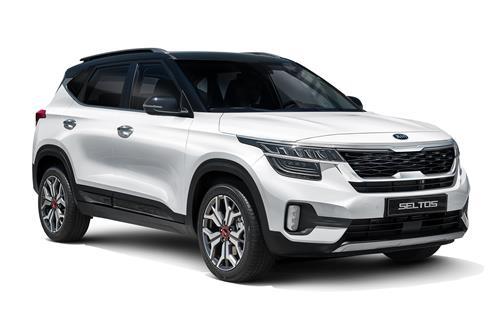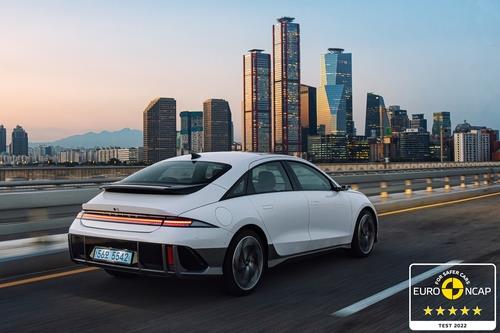- California Assembly OKs highest minimum wage in nation
- S. Korea unveils first graphic cigarette warnings
- US joins with South Korea, Japan in bid to deter North Korea
- LPGA golfer Chun In-gee finally back in action
- S. Korea won’t be top seed in final World Cup qualification round
- US men’s soccer misses 2nd straight Olympics
- US back on track in qualifying with 4-0 win over Guatemala
- High-intensity workout injuries spawn cottage industry
- CDC expands range of Zika mosquitoes into parts of Northeast
- Who knew? ‘The Walking Dead’ is helping families connect
Hyundai to launch IONIQ 6, upgraded Seltos SUV in U.S. next year
South Korea’s Hyundai Motor Group said Friday it will launch the all-electric IONIQ 6 and the upgraded Seltos SUV in the United States next year to boost sales.
Hyundai Motor Co. plans to introduce the IONIQ 6, the second model embedded with the group’s EV-only electric-global modular platform (E-GMP) following the IONIQ 5, in the U.S. in the first half of 2023, the company said in a statement.
Hyundai’s smaller affiliate Kia Corp. also plans to release the Seltos subcompact SUV in the first half after launching the pure electric high-performance model EV6 GT in the world’s most important automobile market this week, it said.


This file photo provided by Kia Motors shows the 2021 Seltos subcompact SUV. (PHOTO NOT FOR SALE) (Yonhap)
The EV6 GT comes with a 77.4 kWh battery pack and can travel up to 342 kilometers on a single charge. It can accelerate from zero to 100 km in only 3.5 seconds. It is equipped with the E-GMP platform.
The two carmakers made the announcements during the 2022 Los Angeles Auto Show scheduled from Nov. 17-27 at the LA Convention Center.
Hyundai Motor plans to roll out 17 EV models by 2030, including six Genesis models, with Kia scheduled to release 14 EVs by 2027.
Hyundai has a car manufacturing plant in Alabama and Kia has one in Georgia. In May, Hyundai Motor Group announced it will invest US$5.54 billion to build a dedicated EV and car battery plant in Georgia, with a goal of beginning production in the first half of 2025.
Hyundai and Kia aim to sell 3.23 million EVs, including 840,000 units in the U.S., in 2030 to account for 12 percent of the global EV market.
From January to October, the carmakers’ sales in the U.S. fell 6.1 percent to 1,210,559 vehicles from 1,289,608 units during the same period of last year amid the extended chip shortage.
Their sales results were partly affected by the passage of the Inflation Reduction Act (IRA), which gives up to US$7,500 in tax credits to buyers of EVs assembled only in North America. The move has sparked concerns that Hyundai and Kia could lose ground in the U.S. market, as they make EVs at domestic plants for export to the U.S.











